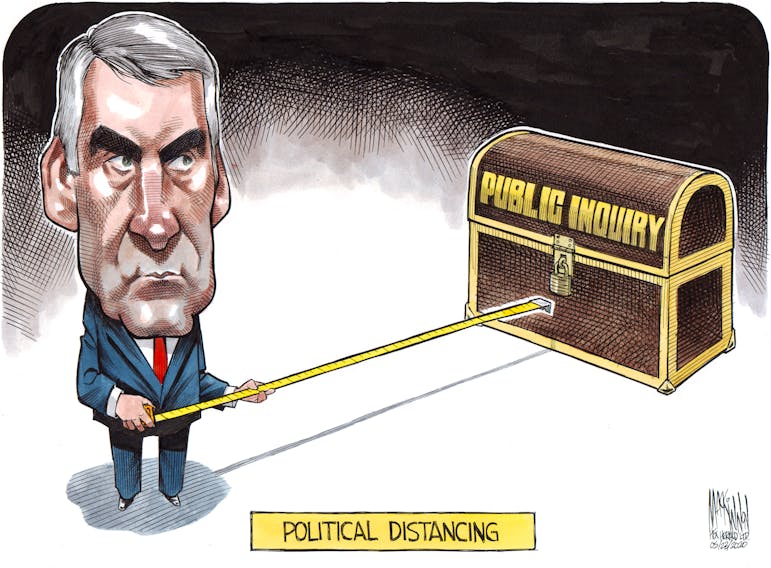Hang on to your hat — I’m going to blaspheme against received wisdom.
After watching public inquiries come and go for decades, I’ve actually accumulated sympathy for governments that resist calling them, on grounds of how often they spin out of control, end up upside down in the ditch, accomplish little and cost a fortune.
In fact, I find it ironic that governments are being accused of coverup by resisting an inquiry. Not that long ago, it was the reverse — governments would often be accused of covering up their failures by lobbing their sticky problems off to an inquiry.
I hate to damp down a good thing, but those who see the calling of a public inquiry into the Portapique murderer's rampage as a great victory for the people over the forces of darkness, and that this will set things right once and for all, are going to be disappointed. Expectations are way over the top.
Consider the most recent major inquiry — also called to a large degree because of the anguish of the victims' families — into missing and murdered Indigenous women and girls, a huge enterprise ($92 million) with hundreds of recommendations to be followed by a federal plan which was supposed to be unveiled June 3, but has been delayed.
Amid Aboriginal groups’ complaints of the usual inaction and delay, the sister of a murdered woman said: “It feels like so much waiting with so little by way of resolution.”
As much as I hate to say this, that’s likely what the families of the victims of the Portapique killer will be saying a couple of years from now, as the thing inevitably bogs down.
Public inquiries with full powers have had a big role in Canadian life — some 450 national ones since Confederation and probably as many provincial ones. Iconic ones defined what we are as a nation: Rowell-Sirois in 1940 paved the way to many of our federal social programs, Laurendeau-Dunton in the 1960s reset the French-English relationship, Hall in the 1960s set up national medicare, and in Nova Scotia, the Marshall and Westray inquiries blew away deep rot in justice and bureaucracy.
Others inquired into scandals and many other things with varying impact. Many — maybe most of them — were rank fig leaves for political failure, and some total disasters.
In the case of this one, I’m not sure what we’re looking for beyond emotional release in reaming out all the details of this evil act, backed by what seems to be a presumption — doubtful, in my view — that there’s a deep, dark secret involved that will explain it all.
Since part of the story is that the killer was abusing his girlfriend — and possibly intended to kill her, too — the important question of when to intervene in cases of domestic abuse is certainly part of it. But the larger part is obviously RCMP operations in general, and whether — despite the heroic actions of individual officers, one of whom lost her life — the chances to snuff this killer earlier were operationally botched.
This, however, is a localized question, especially given the extraordinary nature of the event, and a small part of what are national concerns. The national media will likely only cherry-pick the sensational bits, and no matter what gives, I’ll be surprised if this inquiry makes any difference to the big picture, which is the real elephant in the room.
That big picture was laid out recently by a certain Christian Leuprecht, an expert on public security at the Royal Military College in Kingston, in testimony before a House of Commons committee that made waves.
He made the startling point that some 40 per cent of police interventions in Canada involve mental health issues. The reason for this is cutbacks to women’s shelters, drunk tanks and other social services. Since they are not trained for these non-police roles, their interventions are often ham-fisted, increasing public hostility, which, in turn, leads officers to think first of their own self-defence, increasing the chances of confrontation. Governments have “set police up for failure,” he said.
Meanwhile, at the top, the RCMP structure is a granitic, unaccountable command-and-control structure still carrying the paramilitary culture of its origins.
Leuprecht made another startling point: there have been no less than 15 studies and reports on the RCMP from 2007 to 2017 — all proposing the same thing as the first step in police reform: a civilian management structure at the top (as has been done with the Australian federal police).
No luck. Will the Portapique inquiry go that far (unlikely, given the police background of two of its three commissioners) — and if it does, will it end up as just another study on top of the pile?
At the very least, let us stop obsessing over why or why not the premier dragged his feet on a public inquiry, and focus on what can actually be achieved by it.









